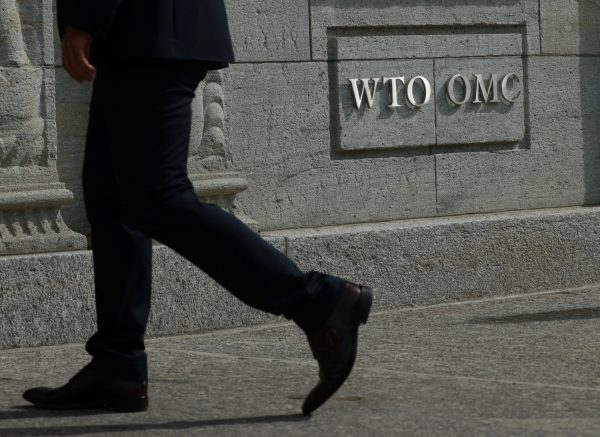Against the backdrop of the US–China trade war, WTO rules need to be updated to reconcile the conflicting legal interpretations and behaviours of the United States and China. While the United States accuses China of engaging in ‘unfair’ trade practices and pressures China to alter its economic policies, China maintains that none of its practices violate WTO rules.
These disagreements are rooted in the lack of clarity in WTO law. For example, the Agreement on Subsidies and Countervailing Measures prohibits discriminatory subsidies given by ‘a government or any public body’. But it is not clear whether state-owned enterprises (SOEs) can be considered public bodies and if China’s assistance to domestic businesses through SOEs violates WTO law. Such ambiguities must be removed for the United States and China to manage their trading relations within the WTO.
The WTO is also suffering from an institutional ‘dual crisis’—a deadlocked legislative function and a paralysed judicial function. On the legislative front, the Doha Round died when major developed and developing countries struggled to reach an agreement on agricultural trade. While plurilateralism is now the mainstream approach, political and legal concerns that inhibit consensus building remain. On the judicial front, the Unites States has accused the Appellate Body of judicial overreach and blocked the appointment of Appellate Body judges. As a result, the WTO dispute settlement mechanism has ceased to function since December 2019.
The legislative and judicial crises are interconnected, as the inability to legislate precludes formal judicial reforms, and judicial overreach disincentivises member states from concluding legally binding agreements. For member states to continue working within the WTO system, this vicious cycle must end.
Despite these complexities, there is a clear chronological order in which WTO reforms should take place — changes to substantive rules are only possible with a functioning institution. In other words, the WTO needs a multi-phased reform strategy.
In the initial phase, the WTO and its member states should prioritise actions that interrupt the mutually reinforcing legislative and judicial crises. As concluding a deal that benefits all WTO member states is difficult, relevant actors should strengthen the consensus building function of joint-statement initiatives (JSIs).
Plurilateral agreements resulting from JSIs are either critical mass agreements, where benefits are offered on a Most Favoured Nation basis, or concluded under Annex Four of the WTO Agreement, where non-participants are excluded. Since critical mass agreements require widespread participation to minimise free riding, and Annex Four agreements need permission from the entire WTO membership, member states must be incentivised to participate in JSIs.
Major powers such as the United States, the European Union and China, and JSI objectors such as India and South Africa, should begin negotiating a set of governance principles that regulate the process of JSIs. For example, plurilateral agreements should follow the principle of development by establishing mechanisms that help signatories benefit from concessions offered by other participants.
In addition, the WTO Secretariat should extend additional analytical support to participating and non-participating developing countries who may be disadvantaged by their lack of expertise. Shared expectations regarding the functioning of JSIs, development-friendly outcomes and improved internal transparency would incentivise participation by low-income countries.
The need to revive the WTO’s judicial function is equally pressing. To restore confidence in the dispute settlement mechanism and enable institutional reforms, the United States must cease its blockade on Appellate Body judge appointments. To incentivise the Unites States, the Dispute Settlement Body can put a hold on appeals of trade remedy panel reports, which have been a major source of their complaints.
Major powers should enter negotiations regarding broader judicial reforms. Mandating that the WTO judicial bodies consult member states regarding ambiguities in WTO agreements may help de-politicise dispute settlement. Member states should also consider establishing a periodic review mechanism for panel and Appellate Body decisions, where members can clarify their intent.
Once the institutional plumbing is under way, the next phase of reform should focus on devising a set of unambiguous rules that can address the conflicting political and economic systems of the United States and China. Future agreements need to contain revised definitions for key terms and clearly delineate when government support for domestic companies is permissible.
It is not productive for the United States to accuse China of acting in bad faith and pressure China to change its policies. The West should work with, rather than resist, Chinese state capitalism. On the other hand, China should recognise the negative international spillovers of its domestic policy and be ready to compromise on SOEs, industrial subsidies and other potentially trade distorting practices.
Rebuilding the WTO will require a series of carefully ordered reforms. By initially pursuing unilateral adjustments and plurilateral initiatives and subsequently updating WTO rules, the WTO and its member states may be able to revive the aging institution. In this process, both the United States and China must lead by making concessions and adhering to the long-term vision of a rules-based trading system.
Zhijie Ding is a research assistant at University of California, Berkeley.

